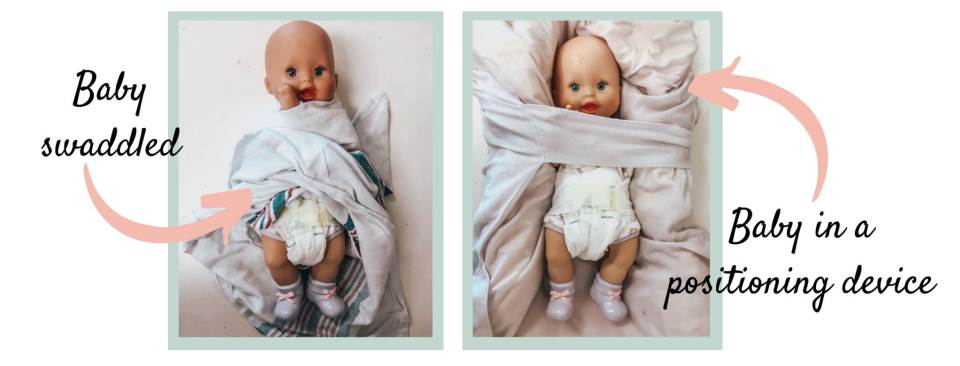
The way NICU (neonatal intensive care unit) caregivers interact with preemies and medically fragile babies during their NICU stay can have a long-term impact on brain development, medical stability, and sensory processing abilities. Do you need practical strategies to use at the bedside to support ‘touch-me-not’ babies in the NICU? Using my unique lens as a NICU occupational therapist, I want to share 4 ways you can prevent stress during interactions and medical care. Plus, 3 ways to support ensure positive long-term outcomes.

This is part 2 of a series on NICU babies who are classified by staff and parents as “touch-me-nots”. Click here to read Part 1 of this series.
A “touch-me-not” is NICU slang for a baby who has poor tolerance to care and handling.
They may have a lot of “events” (like drops in their oxygen or heart rate), or get REALLY irritable during a diaper change or other NICU “task” and have difficulty coping.
Even holding or getting your baby out for skin-to-skin care can be overwhelming, and the babe may need some extra time to recover.
In the first post, I talk a little bit about…
- what a “touch-me-not” is,
- the background of sensory processing in a NICU baby,
- how medical status and age play a role,
- and also about what we SHOULDN’T do with this special population of NICU babies.
Part 1 = Changing our viewpoint and looking at the sensory processing difficulties of these babies.

Part 2 = Practical strategies you can implement at the bedside to decrease stress cues during caregiving and SUPPORT positive outcomes.
Interacting with a medically fragile baby should ALWAYS be done with the support of a bedside nurse, neonatal therapist, and/or medical team.
I am a NICU occupational therapist, but I am not at your baby’s bedside to make individualized recommendations based on their special circumstances.
Please discuss and implement some of these strategies with collaboration of those who know your baby personally.
There’s definitely a supportive and respectful way of looking at NICU babies who have difficulty tolerating interaction and touch experiences.
It takes a lot of critical thinking, patience, and humility from us (their caregivers!).
Let’s talk about some appropriate ways to support sensory processing skills with a baby who is considered a “touch-me-not”…without depriving them of appropriate interaction and learning experiences.
Before every interaction, tell yourself, “Do WITH…not TO”.

Let’s head into practical strategies that support sensory processing, promote medical stability, and build positive brain connections.
1. CHANGE THE ENVIRONMENT.
Ask yourself, “How can I change the environment BEFORE I even start the interaction or assessment?”.
Avoid undoing their swaddle or freeing them from their positioning device before you have everything prepped and ready! Keep them cozy for as long as possible.
Assess their environment FIRST, and do what you can to decrease stimulation.

All of these strategies can be done before that babe is even disturbed.
- Dim the lights.
- Warm your hands.
- Close the door to their room to keep out sound.
- Wave your hands around after gelling or washing hands to dissipate the smell before reaching into an isolette.
- Don’t turn on lights that would be direct into their eyes.
- Turn off the TV (if your rooms have them!).
- Talk with parents about the importance of decreasing stimulation (talking, touching, etc.)
- Parents, talk with your baby’s nurse about keeping things “low-key” during their care time.
Some of these strategies may seem small, but they can be the reason a baby drops their oxygen to 70% at the start of their assessment or not.
I’ve got an example for ya.
I was with a baby who was not tolerating skin-to-skin care. His oxygen saturations were hovering in the 70’s. I noticed the hallway light was in his eyes.
The only thing I did was rotate mom’s chair so her shadow shielded the light from her preemie’s eyes. I wasn’t able to turn the hall light off, and the room lights were already dim.
Here’s the amazing thing…Within 10 seconds, his oxygen saturations had returned to the 90’s!
YES! You guys, little things can make BIG differences.
NICU babies have immature nervous systems and are learning to tolerate all the things. Getting rid of one thing may make a major impact.
2. GRADE YOUR INTERACTIONS.
This trick comes from the mind of a neonatal therapist!
Learn to grade your interactions.
No, this doesn’t mean give yourself an A, B, or even F!
I’m talking about starting slow, and increasing interaction in small increments.
While ALWAYS watching and responding based on your baby’s cues.
- Talk to your baby quietly first, before starting hands-on care.
- Provide a quiet hand hug (without talking) before doing a diaper change.
- Do the least invasive of your tasks first.
- If positioned on their tummy or side, don’t flip baby over first thing.
Grading input doesn’t have to take 10-20 minutes.
Start small…60 seconds of comforting and intentional care can make a major difference.

If the smallest thing is too much, stop.
Your NICU babe will be more comfortable, less stressed, and have fewer “episodes”!
3. LOOK FOR OTHER SENSORY NEEDS.
During the assessment and interaction, observe any other sensory input that may be interrupting your babe’s self-regulation attempts.
You may be taking away stressful sensory input, OR adding in organizing input (like containment, leg bracing).
- Decrease the visual demand (cover their eyes).
- Minimize extra smells.
- Provide support to decrease “free movement”.
- Keep them tucked in flexion.
- Provide oral sucrose or breast milk during oral care for stress prevention.
- Prevent uncontrolled “flailing” movements.

By decreasing sensory demands, you’re…
- Taking away potentially stressful input.
- Decreasing the amount of input your baby is processing.
- Letting your baby zone in on maintaining medical stability.
4. ADAPT YOUR HANDLING.
Small changes in the way we move NICU babies can make MAJOR changes in the way they process the interaction.
In order to create positive, comforting experiences, you may have to learn a new way of doing things.
Every single procedure, lab, exam, and assessment can be adapted to support the baby.

Here are just SOME ideas;
- Try two-handed care (get a buddy!).
- Support your baby in flexion and midline always…even during your assessment.
- Give baby something to brace their feet against (like hands or a positioning device)
- Prioritize mom and dad as the primary caregivers (that baby prefers their smell and touch!)
- Keep all care and interaction to one time (this is called ‘cluster care’)
- Do care with the baby on their side.
- Respond to their cues.

Think, “How can I support this baby FIRST, so I can do my task.”
Working in the NICU is humbling.
It’s humbling to take yourself out of the equation.
To make sure absolutely everything is supporting that precious patient and their family.
Adapting our care and prioritizing babies will help prevent hypersensitivities to touch in the short and long-term!
If we’re going to be successful, we have to…
- Provide comforting interactions CONSISTENTLY.
- ADAPT care so it’s positive instead of stressful.
- PRIORITIZE the baby’s needs over your own.
I hope these strategies help you as you learn the best way to support your NICU babies.
They are so blessed to have you!
Which one of these are you going to try?
Have you tried any of these strategies with your baby?

